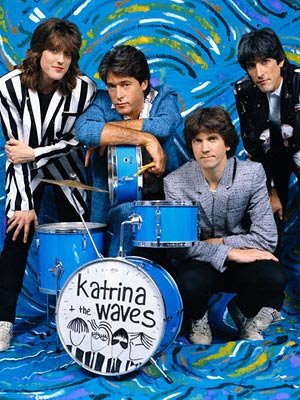Yeah, yeah, I know – most important American band of the last twenty years, bla bla bla.
Save it.

REM – Michael Stipe, Pete Buck, Mike Mills and the long-departed Bill Berry – have been critical darlings and, for the most part, commercial powerhouses for a generation now (it used to really bug my stepson that after a jag of feeling hip that he’d gotten the new REM record, I pulled out my copy of Murmur from my sophomore year of college. Psych).
Well, good for them.

Here’s the maddening thing about REM; I can scarcely listen to a single one of their albums all the way through. Pete Buck once described the band’s is-it-a-stereotype-or-is-it-a-cliche style:”Minor key, mid-tempo, enigmatic, semi-folk-rock-balladish things. That’s what everyone thinks and to a certain degree, that’s true.” REM’s music is all oblique this and badly-enunciated enigmatic reference that and sophomore poetry-class the other thing, and always, always Michael Stipe prancing around going “hreydee-yo hree murrup” and “and nuh freyn konnukter fez, ryever ape, pake a mape”…

Mind you, I don’t mind oblique, enigmatic and sophomoric per se. And I can’t knock the band itself; Mills and Berry were an excellent Watts ‘n Wyman-style rhythm section; Mills has a distinctive yet perfect backing vocal style; Pete Buck is…well, perfectly functional given his chosen limits. And Michael Stipe is a good singer with an excellent (albeit not Bono-like) and distinctive voice.

But most of REM’s music invariably bores me stiff…
…except that every album (that I bothered listening to, which hasn’t happened since 1998’s Up, includes one, and only one, song that I just absolutely love, love love – which always comes out after the dreary, minor-key mid-tempo southern-mythology-sodden ballad.

Album by album:
- Murmur – was entirely dispensable – except that life without “Radio Free Europe” would be a lot poorer. But it’s more a visceral thing – the rhythm section’s tight snap, the cool (if inscrutable) hook line, the zing of the thing. Certainly not the lyrics, as delivered by Michael Stipe “Sigh this elf if radio munna slay/Reason it muld paw ish utta pray/poodat poodata poodta up your wah/Mrs. Islecumfray ah haul. Raving station, be fly…”
- Reckoning led off with the “South Central Rain (I’m Sorry)”, or as Stipe pronounced it, “Um Hawry”, which makes me nod off a bit 25 years later – but followed up with “Don’t Go Back To Rockville”, which was a really good song.
- Fables of the Reconstruction – Produced by Joe Boyd, who produced Richard Thompson’s classic “Shoot Out The Lights”, Fables breaks the pattern only slightly: lead-off single “Driver 8” didn’t suck, and follow-up “Can’t Get There From Here” is actually IPod-worthy.
- Lifes Rich Pageant – Not even Don Gehman – who’d just produced John Mellencamp’s classic Scarecrow, could make most of this album less tedious – except for the gorgeous “Fall On Me”.
- Document – “The One I Love” almost made me pound my ears out with a potato masher. And “Exuming McCarthy” may have been the dumbest anti-Reagan song in a decade full of standouts. But “It’s The End Of The World As We Know It” jumps in at last minute and staves off self-mutilation.
- Green – What if the Brill Building was in Athens, Georgia in 1988, instead of Philadelphia in 1962? You’d have gotten “Stand”, and most of the album. Except “Orange Crush”, which, dude.
- Out of Time – I used to wonder if “Losing My Religion” was a self-parody; if I were going to write a spoof of REM, it’d sound just like LMR, and have just about the same lyrics. But I still love “Shiny Happy People”, although having Kate Pearson on board helps.
- Automatic for the People – Small breach of protocol: “Everybody Hurts” and “Man In The Moon” don’t suck.
- Monster – Bla bla bla “What’s the Frequency KennetH” bla bla bla.
- New Adventures in Hi-Fi – Broke the pattern again – all of it sucked.
- Up, Reveal, Around the Sun, Accelerate – never heard any of ’em.
But as with most of these “things I should love but don’t” pieces, it’s not so much the artist as the artist’s fans. And it’s not just that REM fans are just this side of Grateful Dead fans in terms of worshipping. No, it’s the damage they did.
An alt-rock radio program director I once knew summed up alt-rock in the late eighties: “There are two types of music”, said the learned sage; “Noisy rock, and Jangly rock”. The poles of his universe were Dinosaur Junior on the one hand, and REM on the other. And this program director was hardly alone.

So for a couple of years in the late eighties and early nineties, alt-rock diverged into two miserable paths: sludgy, mopey glop that eventually morphed into grunge, and jangly, folky music in a zillion nearly-identical permutations (The Connells, Wednesday Week, Aztec Camera, Let’s Active!) that eventually morphed into…
…well, landfill. Nobody remembers any of it. Not even – be honest! – most of what REM did.
Well, some of it, we do. Only we can’t make out the damn words.











